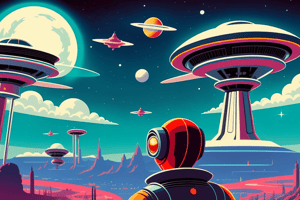Podcast
Questions and Answers
What is the origin of Western astronomy?
What is the origin of Western astronomy?
- The Iliad and Odyssey
- Mesopotamia (correct)
- Egypt
- The Roman Empire
What is the origin of natural philosophy?
What is the origin of natural philosophy?
- The Iliad and Odyssey
- Mesopotamia
- Egypt
- The Greek Archaic period (correct)
What is the main breakthrough of classical physics?
What is the main breakthrough of classical physics?
- Quantum mechanics
- The laws of motion and gravity (correct)
- Calculus
- The theory of relativity
What is the modern era of physics?
What is the modern era of physics?
What is the basis of quantum mechanics?
What is the basis of quantum mechanics?
Flashcards are hidden until you start studying
Study Notes
- Physics is the study of matter and energy.
- Physics is one of the oldest academic disciplines and, through its inclusion of astronomy, perhaps the oldest.
- The origins of Western astronomy can be found in Mesopotamia.
- Egyptian astronomers left monuments showing knowledge of the constellations and the motions of the celestial bodies.
- Greek poet Homer wrote of various celestial objects in his Iliad and Odyssey.
- Later Greek astronomers provided names, which are still used today, for most constellations visible from the Northern Hemisphere.
- Natural philosophy has its origins in Greece during the Archaic period.
- Western Roman Empire fell in the fifth century, and this resulted in a decline in intellectual pursuits in the western part of Europe.
- By contrast, the Eastern Roman Empire (also known as the Byzantine Empire) preserved classical learning and maintained a flourishing intellectual culture.
- Aristotle's principles of physics were criticized, but it is important to identify his evidence he based his views off of.
- Aristotle's science was the backbone of the science we learn in schools today.
- Aristotle published many biological works including The Parts of Animals, in which he discusses both biological science and natural science as well.
- Aristotle's paradigm of motion is a being or entity encompassing different areas in the same body.
- Aristotle believed that change in category (ex. place) and quality (ex. color) of an object is defined as “alteration”.
- A change in substance is a change in matter.
- When it comes to viole
- Classical physics is the physics that was taught in schools until the early 20th century.
- The most important innovations in classical physics were in the field of optics and vision.
- The main breakthroughs in classical physics were the discovery of the laws of motion and gravity, and the development of calculus.
- The modern era of physics began in the early 20th century with the development of quantum mechanics and the theory of relativity.
- Modern physics is used to understand the behavior of objects on everyday scales, and it has improved our understanding of the universe by explaining phenomena such as quantum entanglement and dark matter.
- Classical mechanics is the theoretical framework that largely describes the behavior of objects in the macroscopic world.
- The theory is incomplete and does not account for the behavior of very small objects or very fast objects.
- The theory was replaced by quantum mechanics, which is a more accurate description of the behavior of very small and very fast objects.
- The theory of quantum mechanics is incomplete and does not account for the behavior of very large or very slow objects.
- The theory of quantum mechanics is based on the idea that particles can exist in more than one state at the same time.
- The theory of quantum mechanics is supported by experiments that have been conducted over the course of many years.
- The theory of quantum mechanics is still being refined and additional theories may be needed to fully understand the behavior of particles.
Studying That Suits You
Use AI to generate personalized quizzes and flashcards to suit your learning preferences.





